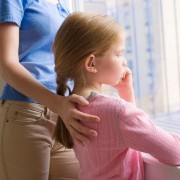 Photo: Getty Images
Photo: Getty Images
Probably one of the most frequently asked questions about family life over the last two decades has been, “Is divorce harmful to children?” Although this is a very important question, it is also important to ask and examine “what are the factors in divorcing families that contribute to children having difficulties and what are the factors that foster their adaptation?
Paul Amato and Kelly Emery (2007) indicate that there are several types of risks that may contribute to children’s difficulties. These are:
2. Economic Loss- another result of divorce is that children living in single parent families are less likely to have as many economic resources as children living in intact families.
3. More Life Stress- divorce often results in many changes in children’s living situations such as changing schools, child care, and/or homes. Children often also have to make adjustments to changes in relationships with friends and extended family members. These changes create a more stressful environment for children.
4. Poor Parental Adjustment- generally how children adapt in families is due in part to the mental health of the parents. This is likely to be true for children in divorced families as well.
5. Lack of Parental Competence- much of what happens to children in general is related to the skill of parents in helping them develop. The competence of parents following divorce is likely to have a major influence on how the children are doing.
6. Exposure to Conflict Between Parents- conflict is frequently part of families and may be especially common in families that have undergone divorce. The degree to which children are exposed to conflict may have significant effects on children’s well-being.
Much of children’s post-divorce adjustment is dependent on the quality of their relationship with each parent before the divorce, the intensity and duration of the parental conflict, and the parent’s ability to focus on the needs of the children in the divorce. Most times, children whose parents are going through a divorce engage in behaviors which are designed to help their children feel secure. The following are some typical experiences of children to divorce and separation:
Denial- this occurs typically in young children and surfaces as storytelling (Mommy and Daddy and me going to Disneyland; we are moving into a duplex and Daddy is going to live next door; they will also have reconciliation fantasies).
Abandonment- when parents separate children often wonders and worry who will take care of them. They are afraid that they too are "divorceable" and will be abandoned by one or both parents.
Preoccupation with Information- children will ask for details of what is going on and how it will affect them. Communication from parents is crucial and needs to be unified as well as age-appropriate.
Anger and Hostility- children may express anger and hostility with peers, siblings and/or parents. School performance may decline. Hostility that is directed inward in children looks and presents itself as depression. Hostility toward parents is most likely directed at the parent perceived to be at fault.
Depression- feeling tired, sleep and eating disturbances, acting out, social withdrawal, and physical injury--which is more prevalent in adolescents--are all signs of children dealing with a major life change.
Immaturity/Hypermaturity- children may regress to an earlier developmental stage when they felt assured of both parents love for each other.
Preoccupation with reconciliation- the more conflict there is between the parents, the longer the children hold onto the idea of their parents’ reconciliation. Children will often act out in ways which force their parents to interact whether it be positively or negatively. Children whose parents were very conflictual during their marriage often mistake the strong emotions of conflict with intimacy. They see the parents engaged in an intimate relationship.
Blame and Guilt- due to the fact that so much marital conflict may be related to the stress of parenting, children often feel responsible for their parents’ divorce. They feel that somehow their behavior contributed to it. This is very true when the parents argue during conversations of the children; children can see that parents are fighting over them. They may even try to bargain their parents back together by promising good behavior.
It should be expected that children will test a parent’s loyalty, not want to hurt the other parent, force parents to interact because they do not want the divorce, try to exert some power in the situation, express anger over the divorce, or they may not want to stop doing what they are doing at that moment.




Add a Comment1 Comments
So true. Parents can have a mindset that sets them up to avoid being reactive, and they can teach their children those skills as well.
Dr. SueAnne Magyar-Hill
http://empoweringchildrenofdivorce.com/emotions/children-and-divorce-holding-onto-negative-emotions/
January 8, 2011 - 5:57pmThis Comment